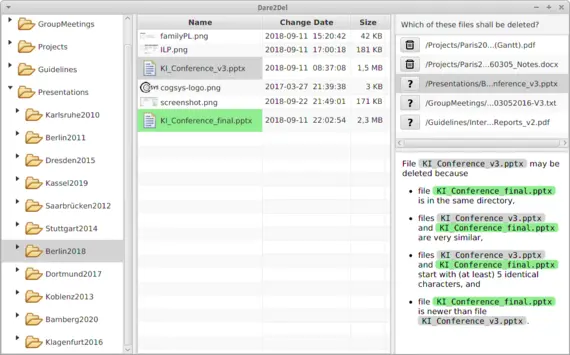
DFG-Project Dare2Del
Research project Dare2Del—"Learning to Delete: Forgetting of Digital Objects as Collaborative Task of Human and AI" within the DFG Schwerpunktprogramm "Intentional Forgetting in Organisationen"
- Duration: second funding period starts fall 2019, three years
- Funding: DFG
- Researchers: Prof. Dr. Ute Schmid, Angelina Olivia Wilczewski, (2023), Durgesh Nandini (2/2020-1/2023)
- Research assistant: Sebastian Seufert (until 2020)
First Funding period:
- Titel Dare2Del -- "Internal and external intentional forgetting – Empirical studies and prototypical realization of an assistance system for the forgetting of digital information"
- Duration: October 2016 – September 2019
- Researchers: Prof. Dr. Ute Schmid, Michael Siebers
- Research assistants: Sebastian Seufert, Kevin Volkert, Harshit Gupta
- Joint project with Lehrstuhl für Psychologie im Arbeitsleben, FAU Erlangen (Prof. Dr. Cornelia Niessen, Kyra Göbel)
Description

Focus of Dare2Del is to support employees in administration and production to regulate their digital knowledge by hiding and deleting irrelevant digital objects. Digital objects that have become irrelevant can hinder the search for information, delay decision-making processes, divert attention away from the actual task and thus impair work performance and well-being. With the ever growing amount of digital data, it becomes more and more important that employees are supported in getting rid of digital clutter (see, e.g. “Desktop Messie” Video, in German) and in avoiding digital hoarding (see, e.g. Zeit Online article, in German).
In the interdisciplinary project, we empirically research intentional forgetting in the working context, on the other, we are developing an interactive, intelligent assistance system that helps employees to detect and delete irrelevant digital objects. Dare2Del is designed as a cognitive companion, that is system decisions have to be made transparent and comprehensible to the user in form of explanations. The system should be able to take into account general and domain-specific knowledge such as specific regulations of an organisation. Decisions which digital objects are irrelevant and consequently can be deleted partially can be based on such organisatorial rules. However, they also strongly depend on user characteristics such as personal preferences and personality traits. To fulfil these requirements, Dare2Del is based on an interactive machine learning approach based on inductive logic programming (ILP). In the project, the generation of different types of expalantions (verbal, example-based) and the use of mutual explanations to guide model adaption and to inspire trust is investigated. For more information about the psychological aspects of Dare2Del refer to Chair of Work and Organizational Psychology’s website.
Publications
- Rabold, J., Siebers, M., Schmid, U. (to appear). Generating Contrastive Explanations for Inductive Logic Programming Based on a Near Miss Approach. Machine Learning. preprint on arxiv
- Schmid, U. Niesen, C. (2021). Mehr Löschen wagen - Ein interaktiv-lernendes Assistenzsystem zur Entfernung überflüssiger Daten vom PC. DFG Magazin forschung, 3/2021, 24-27.
- Schmid, U. (2021). Interactive Learning with Mutual Explanations in Relational Domains. In S. Muggleton and N. Chater (Eds.), Human-Like Machine Intelligence (chap. 17). 338-354. Oxford University Press.
- Thaler, Anna and Schmid, Ute (2021). Explaining Machine Learned Relational Concepts in Visual Domains Effects of Perceived Accuracy on Joint Performance and Trust. Proceedings of the 43th Annual Meeting of the Cognitive Science Society, 1705-1711.
- Gromowski, M., Siebers, M., Schmid, U. (2020). A Process Framework for Inducing and Explaining Datalog Models. Advances in Data Analysis and Classification, SI Learning in Data Science, 14(4), 821-835.
- Niessen, C.; Göbel, K.; Lang, J. W. B.; Schmid, U. (2020). Stop Thinking: An Experience Sampling Study on Suppressing Distractive Thoughts at Work, doi: 10.3389/fpsyg.2020.01616
- Niessen, C., Göbel, K., Siebers, M., Schmid, U. (2020). Time to forget: A review and conceptual framework of intentional forgetting in the digital world of work. Zeitschrift für Arbeits- und Organisationspsychologie, 64(1), 30-45.
- Thomas Ellwart, Anna-Sophie Ulfert, Conny Herbert Antoni, Jörg Becker, Christian Frings, Kyra Göbel, Guido Hertel, Anette Kluge, Sarah M. Meeßen, Cornelia Niessen, Christoph Nohe, Dennis M. Riehle, Yannick Runge, Ute Schmid, Arnulf Schüffler, Michael Siebers, Sabine Sonnentag, Tobias Tempel, Meinald T. Thielsch, Wilken Wehrt (2019). Intentional Forgetting in Socio-Digital Work Systems. AIS Transactions on Enterprise Systems.
- Siebers, M.; Schmid, U. (2019). Please Delete That! Why Should I?. KI - Künstliche Intelligenz, doi: 10.1007/s13218-018-0565-5
- Siebers, M.; Schmid, U. (2018). Was the Year 2000 a Leap Year? Step-Wise Narrowing Theories with Metagol. In: Proceedings of ILP 2018, 141–156, doi: 10.1007/978-3-319-99960-9_9
- Timm, I.J.; Stab, S.; Siebers, M.; Schon, C.; Schmid, U.; Sauerwald, K.; Reuter, L.; Ragni, M.; Niederée, C.; Maus, H.; Kern-Isberner, G.; Jilek, C.; Friemann, P.; Eiter, T.; Dengel, A.; Dames, H.; Bock, T.; Berndt, J. O.; Beierle, C. (2018). Intentional Forgetting in Artificial Intelligence Systems: Perspectives and Challenges. In: Trollmann F., Turhan AY. (eds) KI 2018: Advances in Artificial Intelligence, p. 357-365.
- Niessen, C.; Göbel, K.; Siebers, M.; Schmid, U. (2018). Forget it – delete it? Das Löschen von Informationen im Arbeitsalltag [Forget it – delete it? Deleting Information in Working Life]. In: J. Hartig & H. Horz (Eds.), 51. Kongress der Deutschen Gesellschaft für Psychologie (p. 40). Lengerich, Germany: Pabst Science Publishers.
- Siebers, M.; Schmid, U.; Göbel, K.; Niessen, C. (2017). A Psychonic Approach to the Design of a Cognitive Companion Supporting Intentional Forgetting, (1). doi: 10.17185/duepublico/44537
- Niessen, C.; Göbel, K.; Siebers, M.; Schmid, U. (2017), Intentionales Vergessen im Arbeitsalltag: Eine Critical Incident Untersuchung [Intentional Forgetting in Working Life: A Critical Incident Study] In: Program, 10. Tagung der Fachgruppe Arbeits-, Organisations- und Wirtschaftspsychologie der Deutschen Gesellschaft für Psychologie. "Human Performance in Socio-Technical Systems" (p. 363).
- Siebers, M.; Göbel, K.; Niessen, C.; Schmid, U. (2017), Requirements for a Companion System to Support Identifying Irrelevancy, In: 2017 International Conference on Companion Technology (ICCT), pp. 1-2, doi: 10.1109/COMPANION.2017.8287076. [paper]
Presentations
- Dare2Del Poster Presentation at #UFIS21 – Upper Franconia Innovation Summit: Ein KI System zum Löschen irrelevanter Daten(4.0 MB, 1 page), 6.5.21
- Göbel, K., Niessen, C., Nandini, D., Schmid, U. (2021). Die Rolle von Erklärungen in partnerschaftlichen KI-Systemen: Wem helfen Erklärungen in welchen Situationen wie gut? Session Intentionales Vergessen, GfA Frühjahrskongress 2021.
- Nachvollziehbares Maschinelles Lernen: Kognitive Partnerschaft zwischen Mensch und KI (Schmid, U., 22.5.2019), BMBF Zukunftskongress Souverän in die digitale Zukunft Session Kann KI das alles wirklich? Bonn
- Cooperative Learning with Mutual Explanations (Schmid, U., 26.4.2019) Third Wave AI Workshop, Imperial College London. Invited Talk
- Interactive Learning with Mutual Explanations -- How Humans and Machine Learning Systems can Profit From Each Other (Schmid, U., 5.3.2019). Symposium Fairness and Transparency, towards responsible data science, Universität Leiden, NL., Invited Talk
- Niessen, C., Göbel, K., Siebers, M., Schmid, U. (2019). Evaluation eines Assistenzsystems zur Unterstützung intentionalen Vergessens. Symposiumsbeitrag, AOW 2019.
- Forschung für die Bildung: Kognitive Systeme (Schmid, U., 3.12.2018)
Digital-Gipfel der Bundesregierung, Nürnberg - Explaining Learned Models – Towards Relating Verbal Explanations to Visual Domains for Interactive Learning with Mutual Explanations (Schmid, U., 1.10.2018)
Dagstuhl Seminar "Automating Data Science" (organized by von De Bie, T.; De Raedt, L.; Hoos, H.H.; & Smyth; P.). - Inductive Programming as Approach to Comprehensible Machine Learning (Schmid, U., 25.9.2018)
Keynote at Workshop Formal and Cognitive Reasoning (organized by Ragni, M. et al.), KI 2018. - Interactive Learning to Identify Irrelevant Digital Objects -- An Interpretable Machine Learning Approach (Schmid, U., 12.9.2018)
Conference on Intentional Forgetting in Organizations and Work Settings, Potsdam, Germany. - Was the Year 2000 a Leap Year? Step-wise Narrowing Theories with Metagol (Siebers, M., 4.9.2018)
International Conference on Inductive Logic Programming 2018, Ferrara, Italy. - Explaining Classifier Decisions in an Interactive Learning Environment (Schmid, U., 3.9.2018)
Symposium Cognitive Technical Systems – Towards Fluid Assistants? (organized by Kopp, S.; & Schmid, U.), KogWis 2018, Darmstadt. - Learning to Forget (Siebers, M., 18.9.2017)
Dagstuhl Seminar “Approaches and Applications of Inductive Programming” - Requirements for a Companion System to Support Identifying Irrelevancy (Siebers, M., 12.9.2017)
International Conference on Companion Technology 2017, Ulm. - A Psychonic Approach to the Design of A Cognitive Companion Supporting Intentional Forgetting (Siebers, M., 29.3.2017)
6. Interdisziplinärer Workshop Kognitive Systeme, München.
Media
12.05.2020: fokus.swiss: "Digitales Horten erkennen und vermeiden"
Dare2Del has been covered extensively in the media in January 2020.
Among others, we have been in BILD (print), Zeit online and Sueddeutsche. There were radio interviews in Deutschlandfunk, and others. The project was mentioned in the news of Antenne Bayern and of several TV stations.
Press release of University of Bamberg
Print and online:
13.1.2020:
Süddeutsche: "Künstliche Intelligenz soll beim Ausmisten des PCs helfen"
Die Zeit: "Wie Forscher "Desktop-Messies" helfen wollen"
Chip: "Desktop aufräumen: Neues KI-Programm hilft beim virtuellen Entrümpeln"
Focus: "Wie Forscher „Desktop-Messies“ helfen wollen"
Handelsblatt: "Wie Forscher „Desktop-Messies” helfen wollen"
Mainpost: "Wie Forscher „Desktop-Messies” helfen wollen"
Generalanzeiger Bonn: "Wie Forscher „Desktop-Messies“ helfen wollen"
DEWEZET: "Wie Forscher „Desktop-Messies” helfen wollen"
Berliner Zeitung: "Forscher wollen „Desktop-Messies“ helfen"
Passauer Neue Presse: "Forscher wollen "Desktop-Messies" beim PC-Aufräumen helfen"
Futurezone: "Forscher ermutigen "Desktop-Messies" zum Löschen von Dateien"
Ems-Vechte-Surfer: "Wie Forscher „Desktop-Messies“ helfen wollen"
Westdeutsche Zeitung: "Wie Forscher „Desktop-Messies“ helfen wollen"
CRN: "Mit Künstlicher Intelligenz gegen die Datenexplosion"
Frankenpost: "Künstliche Intelligenz soll «Desktop-Messies» helfen"
Radio:
Antenne Bayern News Tue, Jan 14th
www.radio-bamberg.de/hilfe-fuer-desktop-messies-7918000/
www.br.de/nachrichten/bayern/bamberger-forscher-wollen-daten-messies-helfen,RnRhpwz
www.mdr.de/wissen/faszination-technik/ki-desktop-chaos-aufraeumen-100.html
TV:
www.prosieben.de/tv/newstime/video/202017-newstime-vom-17-januar-2020-ganze-folge (from minute 06:40)Jan 21:
ProSieben (17.55h)
Kabel1 (15.50h)
Sat1 (19.55h)
WELT (whole day)
